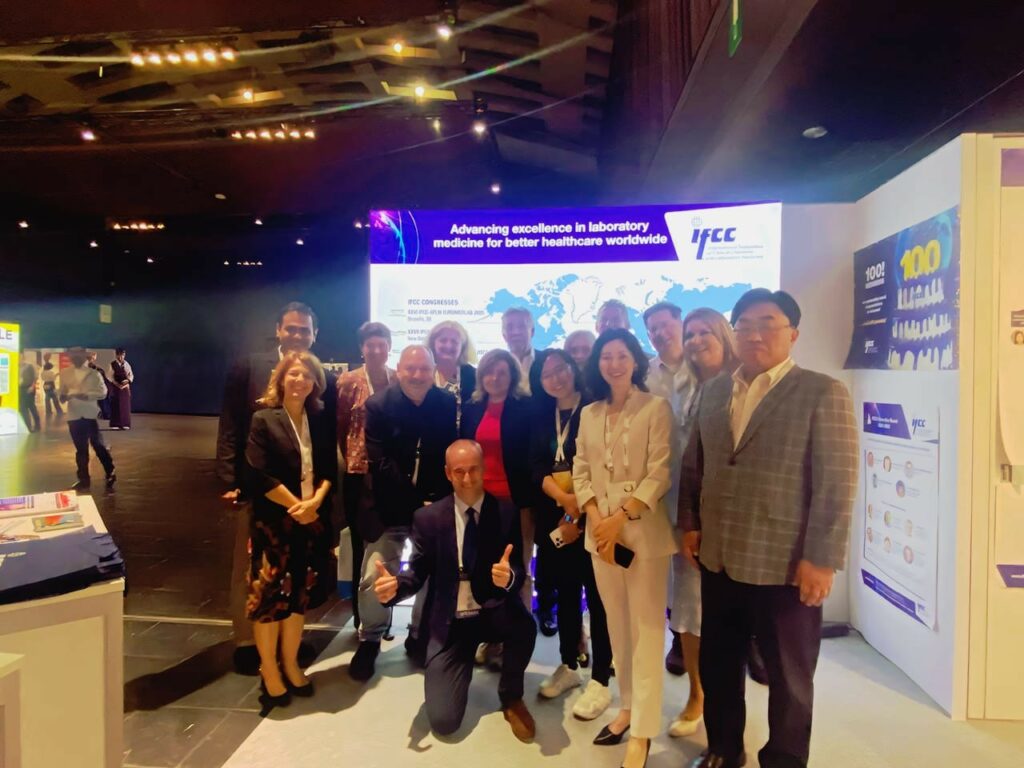Emerging Technologies Division
The IFCC Emerging Technologies Division (ETD) is a new Division proposed and formally ratified by the IFCC Executive Board in 2017. The ETD formally took effect from 1st January 2018.

ETD Executive Committee and Chairs of the ETD Committees and Working Groups at their meeting at EuroMedLab Congress in Brussels (BE), on 19 May 2024
Mission Statement
The ETD is a functional unit responsible for identifying and assessing emerging technologies and for translating the emerging and disruptive diagnostic and data analysis procedures from academic laboratories to clinical laboratories and from clinical laboratories to market.
Strategy
The ETD initiates and manages projects through its Committees and Working Groups (WG). Work is conducted in strict cooperation with other IFCC units and with relevant national and international organisations. The ETD ensures that each of its Committees and Working Groups are functioning under clear terms of reference together with an agreed upon schedule of activity. The ETD will assist in the development of project proposals and will undertake an annual review of progress and review as well as approve documents arising from such projects.
ETD Responsibilities
- The application of emerging technologies and methods including mass spectrometry, high-throughput genotyping techniques, mobile health technologies and data analysis to clinical diagnostic protocols focused on Precision Medicine;
- Defining for each emerging technology the clinical needs and criteria of education of specialists in Laboratory Medicine and caregivers;
- Defining for each emerging technology and method the appropriate infrastructure and laboratory organization;
- Defining for each emerging technology and method pre-analytical, analytical and post-analytical processes necessary for clinical laboratory applications;
- Defining for each emerging technology and method quality programs and certifications required to meet criteria for accreditation up to ISO15189 standard;
- Assess the clinical value of each test with regard to addressing unmet clinical need.
Terms of Reference
The ETD is a functional unit of the IFCC involved in the production of publications arising from activities relating to the application of emerging and disruptive technologies to clinical laboratories.
All ETD activities are well-defined projects, which work within a specified time frame, and are intended to result in a document (an IFCC official document or manual, guideline, or a scientific paper in a refereed international journal), in a product (reference system, service or device), or within the framework of an international activity (scientific workshop, symposium or congress).
The ETD is responsible to the EB and Council to ensure the highest standards of work in its units and for the actions of its members.
ETD Projects
The ETD initiates and manages projects with its own resources or through its Committees and Working Groups. Work is conducted in cooperation with other IFCC units and with relevant national and international organizations. The ETD ensures that each of its Committees and WGs are functioning under clear terms of reference together with an agreed upon schedule of activity. The ETD-EC will assist in the development of the project proposals, and will undertake an annual review of progress as well as review and approve any documents that result from the work. Project applications should be made on the ETD Project Proposal Form (available here).
- The ETD Executive Committee, as the overall managing group for the Division, will ensure the progress of each project, will terminate completed or non-productive projects, and will review the contributions of the members of each functional unit, on a yearly basis.
- Work of the ETD units is carried out in cooperation with other IFCC units, with relevant national and international organizations, and with individuals specifically proficient in a defined area of competence.
- Work within ETD units is to be clearly defined in the goals, terms of reference and a specific timetable for each project.
- An annual review will be carried out by each functional unit for every project within its responsibility.
- The ETD Executive Committee will actively seek, under the appropriate guideline(s) and together with the Corporate Representative on the IFCC Executive Board (EB), the necessary funding to achieve the completion of appropriate scientific projects.
- Outside funding for projects is permitted, but only within the IFCC guidelines for this action (see “Guidelines for Funding from Industry and Other Sources”), and must be approved by the Division Executive Committee and by the IFCC EB. Administration of such funds will be through the IFCC Treasurer’s office.
- The ETD Executive Committee will assign a liaison officer to each of its Committees to monitor the progress of the projects under its responsibility.
- All project proposals will be reviewed by the Divisional Executive Committee and submitted to the IFCC EB for concurrence.
- Preparation of all documents must follow IFCC regulations for publications (see “Guidelines for Preparation of IFCC Documents”).
- The ETD Executive Committee will ensure that Committee and WG Chairs are aware of their responsibilities and of the IFCC resources available to them, and that they communicate promptly and effectively with all corresponding members nominated to their unit
ETD Executive Committee (ETD-EC)
ETD Committees
ETD Working Groups
- Guidance for the Implementation of Custom-made Genomic Panels (WG-CGP)
- Volatolomics (WG-Vol) - Closed in December 2021
- Single Cell and Spatial Transcriptomics (WG-SCST)
- Metabolomics (WG-M)
- Method Evaluation Protocols (WG-MEP)
- Neonatal Bilirubin (WG-NB) - in cooperation with IFCC Scientific Division (SD)
- Health Technologies Assessment (HTA) Core Model for Laboratory Medicine
- Emerging Technologies (ET) for Improving Prevention and Clinical Management of Cardiovascular Diseases (CVD) - (WG-CARDIOIMPACT)
- Microsampling (WG-MISP)
Corporate Member Activities
The Corporate Members bring relevant industry expertise, experience and support to the Division to facilitate more involvement, voice, support from IFCC industry members and help drive Executive Committee’s missions and projects. IFCC Corporate Members may propose projects.